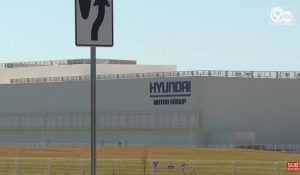Approximately 475 ‘unlawful aliens’ were apprehended in a raid targeting the new battery plant near Savannah, Georgia being built by Hyundai and partner LG Energy Solution, according to ICE officials, who oversaw what was described as the single largest enforcement operation in ICE history.
The raid shut down construction of the plant located in Ellabell, Georgia — approximately 30 miles west of Savannah. The facility’s construction is being supervised for the South Korean automaker by another South Korean company, LG Energy Solution.
The Department of Homeland Security, to which ICE reports, said a majority of those arrested were South Korean nationals. It has long been the practice of South Korean companies like Hyundai and LG to assign South Korean nationals to projects in the United States.
Hyundai searches for answers
In the past, South Korean employees are routinely given work permits and visas to cover their stay in the U.S. while employed in their company’s projects. ICE, however, has targeted other large employers in the Trump administration’s search for what it describes as illegal aliens, working in the U.S.
In a statement emailed to the media, Hyundai said, “We are aware of the recent incident at the HL-GA Battery Company construction site in Bryan County, Georgia. We are closely monitoring the situation and working to understand the specific circumstances. As of today, it is our understanding that none of those detained is directly employed by Hyundai Motor Company.
“We prioritize the safety and well-being of everyone working at the site and comply with all laws and regulations wherever we operate,” the statement concluded
Raid comes despite major investment by South Koreans

Hyundai Executive Chairman Euisin Chung met with Pres. Donald Trump at the White House early this year to announce what now stands as $26 billion in investments in the U.S.
The Hyundai Motor Group currently operates a number of factories in the Southern U.S., including a Hyundai assembly plant in Alabama and a Kia line in Georgia. It recently launched the Hyundai Metaplant in Southeast Georgia to built EVs and other electrified vehicles, and has been setting up the Savannah facility to provide a domestic source for batteries – a high priority for the Trump administration in its effort to reduce dependence upon foreign autos and auto parts.
The battery plan currently is the single largest construction site in Georgia and is part of a $26 billion investment program in the U.S. by the South Korean automaker, which has been touted by President Donald Trump as a sign of the unfolding success of his controversial tariff policy. Among other things, Hyundai earlier this year announced plans for a new steel mill in Louisiana, primarily to supply its automaking operations.
More Hyundai News
- First Drive: 2026 Hyundai Palisade
- Hyundai Announces Massive U.S. Investment in Meeting with Trump
- Hyundai’s U.S. Investment Grows to $26 Billion
No free pass
Neither Hyundai nor ICE have provided specific details on the detainments at the Georgia battery plant. It is unclear whether the automaker and LG thought that the workers had a legal right to be working on construction. In recent months there have been a number of instances of overreach by federal authorities, many of whom are heavily armed, masked and who fail to provide proper documentation when making arrests. In a number of cases, however, those detained have later been found to be either U.S. citizens or properly documented foreigners.
Of all foreign manufacturers, none has made more of a commitment to invest in the U.S. since Trump’s January inauguration than the Hyundai Motor Group. It recently increased its plan from $21 billion to more than $26 billion.
Whether the company thought that might minimize problems with the Department of Homeland Security is unclear.
The new Georgia battery plant is critical for the automaker. Earlier this week, Hyundai reported EV sales in August had surged 72% year-over-year in the face of the Trump administration’s push to shut off the electric-vehicle tax credit, which officially ends September 30.









0 Comments